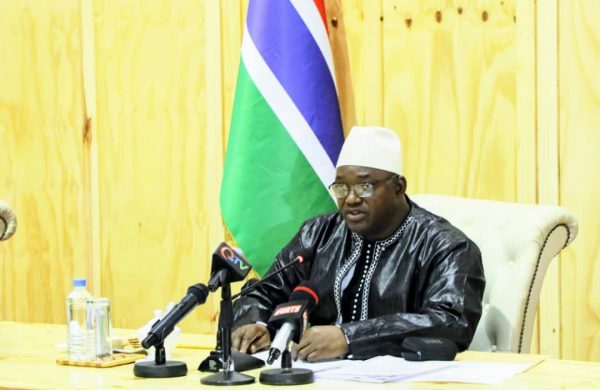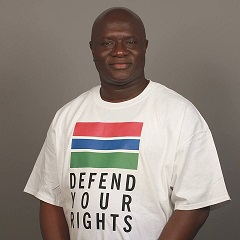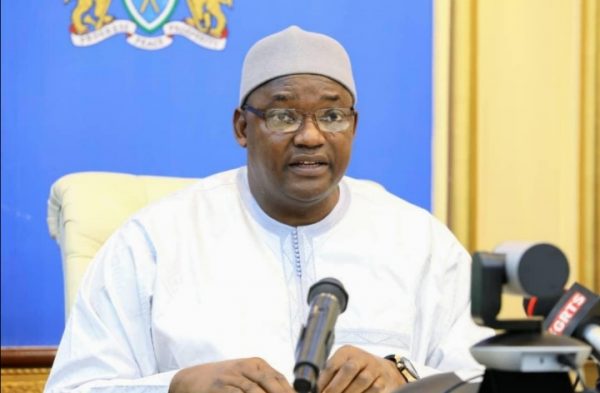
Gambia’s foremost human rights defender and good governance campaigner, Madi Jobarteh is to appear in court today on politically-motivated charges of false publication and broadcasting by the government.
Madi Jobarteh has been a constant torment of this government, scrutinising every bit of their actions and inactions, decision and indecisions as well as commissions and omissions to obfuscate the fact and reality of rising abuse of power and runaway corruption.
The arrest of Madi Jobarteh is a sure way of President Adama Barrow sending an unequivocal message that criticisms of his government would not be tolerated.
And the clampdown on critics of the government will intensify as The Gambia moves closer to the presidential elections in December 2021.
Madi Jobarteh’s arrest did not come as a surprise given a catalogue of human rights abuse and violations of the government. The flimsy charges of false publication and broadcasting shows that the government was waiting for an opportunity to clip the wings of Madi Jobarteh. He was first invited for interrogation at the Kairaba Police Station on 1 July and released on bail without any formal charges.
According to Madi, a senior police officer told him that his arrest was a “directive from above”, which reeks of politically-motivated arrest. Moreover, Gambians know too well the tired practice of the former government of Yahya Jammeh releasing someone on bail without a charge.
On his second visit, he was later read his charges at the Prosecutor Unit at the Kanifing Police Station for false publication and broadcasting. His only crime was to condemn the killing of Ousman Darboe, Haruna Jatta and Kebba Secka in the hands of police. This statement was made in an interview with the media at the ‘Black Lives Matter’ protest, which was a befitting moment to raise the issue of police brutality.

It is evident to all Gambians that the previously camera-shy and timid President Adama Barrow has now turned into the confident, power-hungry man seeking to become the third longest-serving president of The Gambia.
The first president, late Dawda Kairaba Jawara governed for 24 years, while former president Yahya Jammeh exiled in Equatorial Guinea ruled for 22 years. President Barrow is scheming to stay in power for at least 15 years.
If the drafted constitution is voted in a referendum before the 2021 elections, this will pave the way for a new republic. On the basis of a new constitution and a new republic, President Barrow and his acolytes are in their rights to make a case that the new constitution has reset the clock on his mandate, allowing him to run for two five-year terms in office. This means Barrow could stay in office until 2031.
But, if President Barrow manages to dribble Gambians and used the Covid-19 pandemics as excuse to delay a referendum until after the 2021 presidential elections, then he would have the chance to stay for 20 years in power. This is not a far-fetched scenario as Barrow and his acolytes are hellbent on outstaying their welcome in office.
As Barrow gets more comfortable in power, so his administration will grow in dictatorship. So far, it beggars belief the human rights violations and abuses committed during President Barrow’s short time in office.
In less than three years, President Barrow had presided over the death of eight civilians in the hands of police with score of people injured and arrested for taking part in demonstrations. The catalogue of human right abuses and police brutality reveals President Barrow’s complete disregard for human rights protections in The Gambia.
Barely six months into Barrow’s presidency, the first civilian, Haruna Jatta lost his life from gunshot injuries after security forces opened fire on unarmed protesters on 2 June 2017 in Kanilai. President Barrow’s acquiescence of police using live ammunition on civilians led to officers of the Police Intervention Unit (PIU) firing live bullets on 18 June 2018 at unarmed villagers, protesting against the mining of sand in their village in Faraba Banta without their consent. Two civilians, Bakary Kujabi and Ismaila Bah died of gunshots on the day of the protest.
After the Faraba Banta incident, a police officer was again involved in the killing of a civilian. First Class Constable Lamin Trawally used a knife to stab to death Kebba Secka, a university student on 7 July 2019 when the latter resisted an arrest. in the same month, Ousman Darboe, a vendor lost his life shortly after being released from the custody of the Anti-Crime Unit (ACU). The family of the deceased alleged that Darboe was detained beyond the mandated 72 hours and tortured while in custody, which led to his death.
Beside the killings of civilians, there have been attempts by the Barrow administration to stifle criticisms with the closure of radio stations, Home Digital FM and King FM radio as well as the arrests of Ismaila Ceesay, a university lecturer, the 3-Years Jotna young leaders and journalists including Pa Modou Bojang, Ebrima Jallow and Madiou Jallow.
The space for freedom of speech remains limited and gradually shrinking as in May 2018, the Supreme Court made a ruling that criminalises abuses against the president. This decision by the Supreme Court means that any criticism against the president can be contrived for political purpose to arrest critics.
Moreover, Barrow made a public threat against critics whom he described as “faceless detractors” on Gambia’s Independence Day, 18 February 2019. In the same year, Amnesty International raised concerns over the deteriorating human rights situation and urged the government to ensure that ACU and PIU of the Gambia Police Force and the State Intelligence Services (SIS) end excessive use of force, unlawful arrests and detention of people beyond the 72-hour period.
As the 2021 elections draw closer, the Barrow administration will go all out to silence his critics to ensure he stays in office by any means possible. If Gambians think that the Jammeh’s days of persecution, intimidation and harassment in the form of arbitrary arrests, long detention without trial, torture are over, think again.
By Murtala Touray





